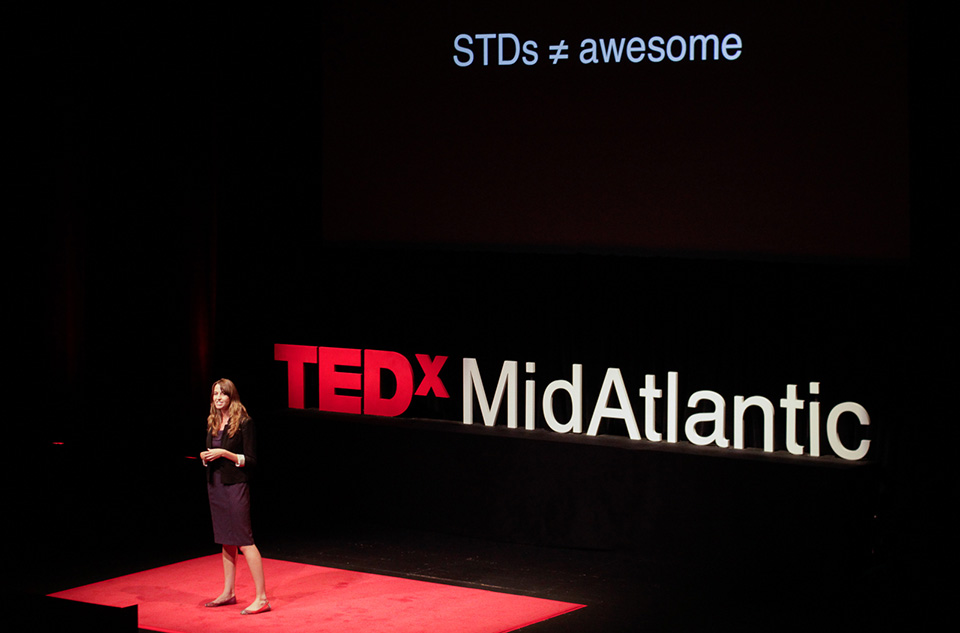
Prototype Fund recipient uses tech to make sexual health information more accessible

Photo: Jessica Ladd by TEDxMidAtlantic on Flickr.
Jessica Ladd believes her whole life has pointed her toward working in sexual health and well-being.
Ladd, 29, is founder and CEO of Sexual Health Innovations, a nonprofit focused on using technology to break down barriers for communication around sexual health issues.
She grew up on San Francisco’s Castro Street during the AIDS epidemic – a time she looks back at as “really feeling like my city was dying around me.” In her late teens and into her 20s, many issues that affected her and her friends were related to sexual health: stigmas, shame, sexual assaults, abortions and sexually transmitted diseases. Often Ladd’s friends would come to her as a resource, because they believed information they found online was in indecipherable, big blocks of text that didn’t answer their questions.
“There’s a lot of communication that doesn’t happen around sexual health and sexuality, often because of the stigma attached to these issues,” Ladd said.
Last year, Ladd and her organization received $35,000 in support from the Knight Prototype Fund to further develop Private Results, Sexual Health Innovation’s delivery service for the results of tests for sexually transmitted diseases. The Knight Prototype Fund helps innovators take early-stage information ideas from concept to demo. Participants join a cohort of other projects, receive human-centered design training and typically spend six months developing their ideas.
Private Results – expected to be launched in Baltimore later this year in collaboration with the city’s health department – will allow patients to call an automated toll-free number or visit a secure website to access their STD test results and find out whether they need to return to a clinic. Private Results doesn’t have access to sensitive data such as names or Social Security numbers that would correlate a person’s results with their identity. Personal data will all be securely stored on Baltimore city servers. Patients use numerical login information to access results.
Currently, 40 percent of patients in Baltimore don’t return in-person to get their test results for STDs – often because of barriers that Ladd says include facilities only being open during the workday and different locations being open on different days of the week. The way the existing system works is “really frustrating for the patients and the providers right now,” she added. With Private Results, it will help not only patients access test results through the phone or online, but also Ladd believes it will help save time for health department workers, who can instead spend those hours working out in the field.
The goal with the Prototype Fund support was to develop a Private Results API (application programming interface), which would allow for data sharing among clinics, health departments and the Centers for Disease Control and Prevention. But by focusing on human-centered design during the Prototype Fund experience, Ladd and her team discovered that the API wasn’t a big need. “If we had asked the right questions earlier on, we could have pivoted sooner,” she said. The team shifted its focus to another challenge: how to pipe in data from electronic medical records across Baltimore into the city’s health department database. (Ladd earned her Master of Public Health from Johns Hopkins University in Baltimore.)
Sexual Health Innovations has also developed other initiatives including So They Can Know, a platform that allows users diagnosed with a sexually transmitted infection to get guidance on how to notify their partners.
This fall, the organization is also launching Callisto, a college sexual assault reporting system that will improve survivors’ reporting process. A college sexual assault survivor herself who found the reporting process “very difficult and traumatizing,” Ladd says Callisto “creates as empowering as possible reporting experience for sexual assault survivors.” Currently, according to the Bureau of Justice Statistics, only 20 percent of college sexual assault survivors ever report an incident.
Callisto will be school-specific and will first be used beginning this month by the University of San Francisco and Pomona College in Claremont, Calif. Survivors can fill out a secure, time-stamped online form documenting the assault and then learn about his or her reporting options.
“What we’re trying to really do is increase the transparency and control that survivors have over this process and keep their options open while they’re trying to decide what to do,” Ladd said.
Ladd has emerged as a young leader in social issues: She interned with the White House Domestic Policy Council and co-founded The Social Innovation Lab. Within a decade, Ladd hopes that it will be easier for people to easily access and share sexual health information needed to protect themselves, their partners and their communities.
“Information … is a very low-hanging fruit, and one that we have the tools or we can build the tools to make that happen in a really scalable, efficient way,” Ladd said. “We just have to have the will to do so.”
Vignesh Ramachandran is a Bay Area-based freelance journalist. He can be reached via email at [email protected].
The next deadline for the Knight Prototype Fund is Aug. 17, 2015. Apply at prototypefund.org.
Recent Content
-
Artsarticle ·
-
Artsarticle ·
-
Community Impactarticle ·


